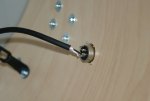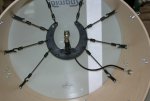Stroman
Diamond Member
A few years ago I installed an XLR jack in my bass drum shell and attached a short length of cable inside, plugged into my D6 (which has been living in a Kelly Shu suspension mount). It has worked fine for live work, and I've been satisfied with the sound and thrilled with the convenience.
The other day I got the urge to test different mic positions while recording, comparing them to the internal mic sound. Surprisingly (to me), I needed MUCH less gain when the mic was connected directly to the cable than when the using my bass drum XLR jack.
Is this normal, or do I have an issue with the jack? I soldered the cut off piece of cable inside the bass drum myself, and the connection LOOKS secure and has held up for almost three years now, but I can't think of what else the problem could be. (same mic was used)
I'll include a pic, so you can see what I'm talking about.
Dennis, or anyone else, do you have any advice
The other day I got the urge to test different mic positions while recording, comparing them to the internal mic sound. Surprisingly (to me), I needed MUCH less gain when the mic was connected directly to the cable than when the using my bass drum XLR jack.
Is this normal, or do I have an issue with the jack? I soldered the cut off piece of cable inside the bass drum myself, and the connection LOOKS secure and has held up for almost three years now, but I can't think of what else the problem could be. (same mic was used)
I'll include a pic, so you can see what I'm talking about.
Dennis, or anyone else, do you have any advice



